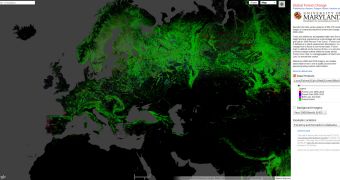Google has one of the best mapping tools in the world, if not the best, so using it for things beyond traffic directions and checking out how the South Pole looks in Street View makes sense.
The company is using its Earth Engine tools to create a global deforestation map. The map uses satellite data to paint a picture of forest gains and losses in the period between 2000 and 2012.
Surprising no one, it's not a pretty picture. The world lost a huge part of forests in that period, the equivalent of the area of the state of Alaska. This means that, while the world is putting out more carbon dioxide into the atmosphere, we're also reducing the amount that's being absorbed by forests.
"In a collaboration led by researchers at the University of Maryland, we built a new map product that quantifies global forest extent and change from 2000 to 2012," Google explains.
"This product is the first of its kind, a global 30 meter resolution thematic map of the Earth’s land surface that offers a consistent characterization of forest change at a resolution that is high enough to be locally relevant as well. It captures myriad forest dynamics, including fires, tornadoes, disease and logging," it adds.
Google used imagery by NASA and the US Geological Survey's Landsat 7 satellite to create this map. It went through 650,000 images captured by the Enhanced Thematic Mapper Plus (ETM+) onboard the satellite.
The University of Maryland created the algorithms to detect forest loss areas, as well as regions where new forests are being planted. Google then used the model with the data from NASA on its Earth Engine to make sense of it all.
"Despite the reduction in Brazilian deforestation over the study period, increasing rates of forest loss in countries such as Indonesia, Malaysia, Tanzania, Angola, Peru and Paraguay resulted in a statistically significant trend in increasing tropical forest loss. The maps and statistics from this study fill an information void for many parts of the world," Google concluded.

 14 DAY TRIAL //
14 DAY TRIAL //